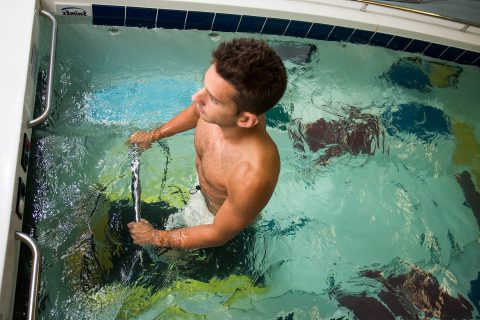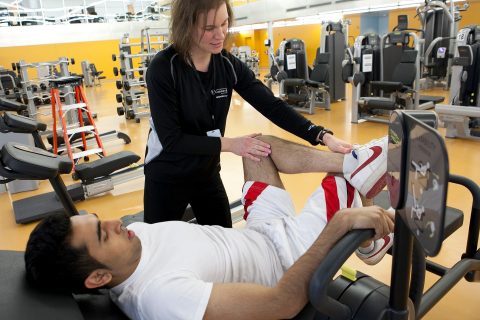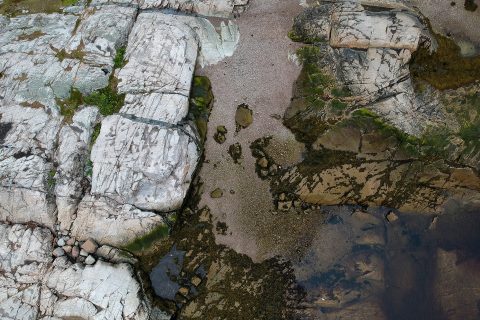Exercise Science (BSc)
Why study Exercise Science?
Explore the science behind human exercise, health and physical activity. Our programs give you the professional knowledge and skills to interpret, apply and conduct health science research. You learn to assess, evaluate and design programs that can maintain and improve health, fitness and athletic performance.
Through lectures, hands-on lab instruction and internships, you practice clinical skills related to rehabilitation, and the improvement or maintenance of personal health. Working in small groups and using state-of-the-art facilities, you study a range of people, from individuals suffering from chronic disease to elite athletes.
The department offers you three options to specialize in:
- Honours program: gives you the chance to participate in focused research with faculty
- Athletic Therapy: the only program of its kind in Eastern Canada, accredited by the Canadian Athletic Therapists Association (CATA)
- Kinesiology and Clinical Exercise Physiology: assess, evaluate and design exercise programs for people requiring special medical attention
Whatever option you choose, you will graduate with an applied knowledge of health science that focuses on health and fitness.
Special funding for out-of-province students
Up to $4000 for undergraduate programs.
Program structure
A Bachelor of Science degree takes a minimum of three or four years (90 – 120 credits) of full-time study, depending on your academic background.
Program options
- Major in Exercise Science (45 credits)
- Honours in Exercise Science* (60 credits)
The BSc Honours in Exercise Science offers additional courses providing research training in a variety of applied-science and health areas. Students graduating from the BSc Honours program will possess an academic background compatible with the entry requirements for the majority of graduate schools. Students must meet the University regulations concerning the Honours degree.
- Honours in Kinesiology and Clinical Exercise Physiology* (78 credits)
- Honours in Athletic Therapy* (102 credits)
*Students seeking admission to the Honours program apply to the Department Honours Committee normally following the completion of 24 program credits. Applications should be uploaded to the moodle site called "HKAP Honours Applicants" by March 15. To gain access to this moodle page email the honours committee Dr. Darlington. Detailed application instructions are found on the moodle page.
Concentrations
Students may apply for a transfer to Kinesiology and Clinical Exercise Physiology after having completed certain courses and obtained a Grade Point Average of 3.0.
Courses
United States students: A U.S. Federal Student Aid-eligible version of this program is offered. This version meets all U.S. regulations (such as no co-operative education or e-courses) for eligible programs.
Admission criteria
Minimum cut-off averages and course requirements
- Quebec CEGEP: 27 overall, 24 math / science
- Admission is based on the CRC requirements indicated above and completion of the following classes as part of their DEC: Calculus 1 and Calculus 2; Mechanics, Electricity and Magnetism and Wave, Optics and Modern Physics; General Chemistry and Chemistry of Solutions; General Biology (OR Cellular Biology AND Ecology and Evolution)
- Additional information for CEGEP applicants
- High School: B- overall, B- in math / sciences
- Completed courses in the disciplines of Calculus, Biology, Chemistry and Physics.
- One math from Pre-Calculus, Calculus, or equivalent
- Two sciences (from Biology, Chemistry or Physics)
- ACT or SAT is NOT required
- Canadian curricula course requirements
- Accepted international qualifications
- Completed courses in the disciplines of Calculus, Biology, Chemistry and Physics.
- International Baccalaureate (IB) diploma: 27 overall, 4 HL or 5 SL math, 4 HL science
- one math (Applications and Interpretations HL, Analysis and Approaches HL or Analysis and Approaches SL)
- one science (Physics, Chemistry or Biology, either SL or HL)
- one of the math or science courses must be completed at the HL level
- International Baccalaureate Career-related Programme (CP): 4.5/7 overall, 4 HL or 5 SL math, 4 HL science
- one math (Applications and Interpretations HL, Analysis and Approaches HL or Analysis and Approaches SL)
- one science (Physics, Chemistry or Biology, either SL or HL)
- one of the math or science courses must be completed at the HL level
- Additional Career-related Programme (CP) course requirements
- Baccalauréat français: 12 overall, 12 in math / science
- Première: Spécialité mathématiques AND Spécialité physique-chimie
Terminale: Spécialité mathématiques (also accepted, Spécialité Physique-Chimie AND Mathématiques Complémentaires)
- Première: Spécialité mathématiques AND Spécialité physique-chimie
- British system of education (GCE):
- A-levels: At least two A-level exams CC, C in math, C in science or
- AS-levels: At least 4 AS-level exams with equivalent results or
- BTEC: Level 3 Diploma or Extended Diploma in a related subject area with equivalent results
- Students without math or science A-levels may be admissible based on AS-level or iGCSE/GCSE/O-Level exam results. Students should include all their exam results from iGCSE (or equivalent) onwards to support their application.
- Additional information for British System of Education (GCE) applicants
- University Transfers (internal/external): B- overall, B- in math / sciences
- Completed courses in the disciplines of Calculus, Biology, Chemistry and Physics.
Minimum cut-off averages should be used as indicators. The cut-off data may change depending on the applicant pool. Applicants who meet the stated minimum requirements are not guaranteed admission to these programs.
Application deadlines
It’s not too late to apply
Most undergraduate programs are still accepting applications for fall 2026.

FALL ENTRY (September)
Deadline: March 1
U.S. and international applicants: Apply no later than February 1 to allow time for immigration document processing. However, applying earlier is strongly recommended. Immigration processing times vary by country and delays could prevent you from starting your studies on time.

WINTER ENTRY (January)
Deadline: November 1
U.S. and international applicants: Apply no later than August 1 to allow time for immigration document processing. However, applying earlier is strongly recommended. Immigration processing times vary by country and delays could prevent you from starting your studies on time.
We reserve the right to close admission to a program at any time after the official deadline without prior notice.
After your degree
Our programs open up career paths in health- and fitness-related sectors that can include:
- Kinesiology and Clinical Exercise Physiology
- Assess human movement, performance and function in healthy and clinical populations
- Develop rehabilitation programs for people with various chronic diseases (cardiac, pulmonary, metabolic, oncologic, renal, etc.) and clients with injuries
- Create, plan and implement a variety of fitness activities and programs for diverse populations
- Promote healthy lifestyles to enhance quality of life
- Conduct workplace assessment to reduce the risk of employee injury
- Certified Athletic Therapist in Canada (C.A.T.[C])
- Professional sport
- National athletes
- Clinical settings
Student story

Sabrina Manolakos
Honours in Athletic Therapy
Internships are so much more intense than class, and you really get to apply your knowledge.
Other programs of interest

The Athletic Therapy program will help you develop the knowledge and practical skills needed for injury prevention, emergency services, and rehabilitation.
Department
Department of Health, Kinesiology, and Applied Physiology
Faculty

The Kinesiology and Clinical Exercise Physiology program will help you how to adapt traditional exercise forms, fitness assessment techniques and training protocols to meet the needs of people with physical and sensory impairments.
Department
Department of Health, Kinesiology, and Applied Physiology
Faculty

As an environmental geography major, you’ll take courses in geography, geology and biology, and enjoy the flexibility to complement your studies in another field of interest.
Department
Department of Geography, Planning and Environment
Faculty

